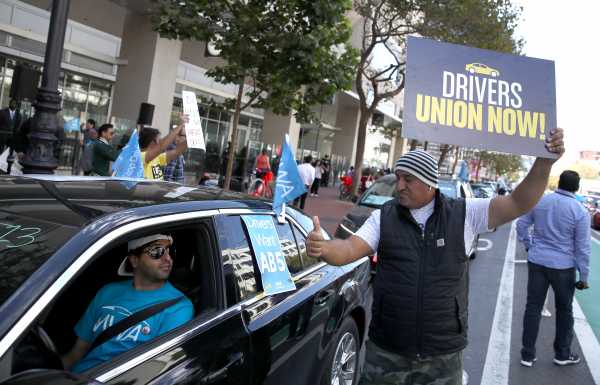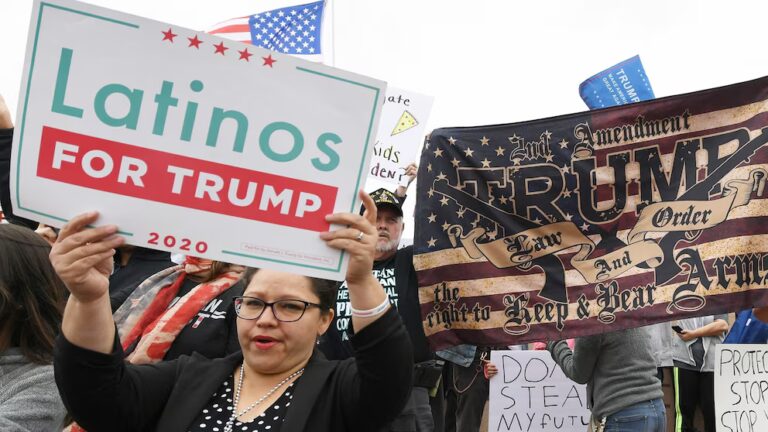
Uber drivers in California are one step closer to becoming Uber employees.
On Friday, state senators on the appropriations committee voted for AB 5 — a controversial bill that would require companies to classify workers as employees, not independent contractors (with few exceptions). And despite an aggressive lobbying campaign, Uber and Lyft were not exempted.
Lawmakers voted 5-2 to send the bill to the Senate floor for a final vote.
If AB 5 passes the full Senate, it would essentially disrupt a business model championed and cherished by Silicon Valley. Uber, Lyft, and other app-based gig companies rely on hundreds of thousands of independent contractors to give rides, deliver food, and complete other tasks.
Reclassifying them as employees would change everything.
Gig workers would get labor protections and benefits that all employees get, such as unemployment insurance, health care subsidies, paid parental leave, overtime pay, workers’ compensation, paid rest breaks, and a guaranteed $12 minimum hourly wage. And, perhaps more importantly, they would be able to unionize.
The added cost of these benefits is why gig companies are so desperate for a compromise. The didn’t get one Friday, but they’re still hoping to strike a deal.
“We stand committed to make the necessary changes to our business to do right by drivers and ensure this first-of-its-kind framework becomes a reality in California,” the company wrote in a post published on Medium. Uber promised to give drivers a minimum pay rate of $21 per hour while dropping off and picking up passengers, and a legal right to influence company decisions that affect them.
So far, lawmakers aren’t willing compromise. So Uber, Lyft, and DoorDash have warned that they were each ready to spend $30 million on a ballot initiative to overturn AB 5 if it ultimately passes.
“We’re confident that California voters support a solution that pairs worker flexibility with economic security,” wrote Max Rettig, head of public policy for DoorDash, in a statement shared Thursday with Vox.
California labor unions, which support AB 5, immediately shot back.
“We will meet the gig companies’ absurd political spending with a vigorous worker-led campaign to defeat this measure to ensure working people have the basic job protections and the right to organize a union they deserve under the law,” Art Pulaski, treasury secretary of the California Labor Federation, wrote in a statement to Vox.
The fight between labor unions and Uber — one of Silicon Valley’s most cherished investments — is perhaps the most consequential legislative battle taking place in the country. And Friday’s committee vote suggests Uber is losing.
The stakes are high for workers and businesses — and candidates are taking sides
AB 5, which passed the state Assembly in May, presents the biggest challenge yet to the ride-hailing companies’ business models and would rewrite the rules of the entire gig economy. Hundreds of thousands of independent contractors in California, ranging from Uber and Amazon drivers to manicurists and exotic dancers, would likely become employees under the bill.
The sweeping bill, backed by labor unions, would make it much harder for companies to classify employees as independent contractors, a common practice that has allowed businesses to skirt state and federal labor laws.
The fight has escalated so much that even presidential front runners have weighed it.
First, it was Sen. Elizabeth Warren, who said in an op-ed earlier this month that “all Democrats need to stand up and say, without hedging, that we support AB 5 and back full employee status for gig workers.” Sen. Bernie Sanders, who has introduced a similar bill at the federal level, later gave his unequivocal endorsement. Last week, Sen. Kamala Harris’s campaign said she supported AB 5 too. This week, South Bend, Indiana, Mayor Pete Buttigieg announced his support of the bill while rallying with Uber drivers outside of the company’s headquarters in San Francisco.
Their endorsements are another sign that not only is the Democratic Party is becoming far more progressive, but that this state fight could have national implications. Presidential contenders want to be on the right side of it. In the past, mainstream Democrats would have been careful not to anger big business donors and powerful tech companies like Uber, and more than likely would have sought a compromise.
But Warren, Harris, and Sanders are pressuring California lawmakers to make no exceptions for app-based gig companies like Uber. That alone reflects the growing power of the US labor movement.
California’s AB 5 bill, explained
The California bill, known as AB 5, expands a groundbreaking California Supreme Court decision last year known as Dynamex. The ruling and the bill instruct businesses to use the so-called “ABC test” to figure out whether a worker is an employee. To hire an independent contractor, businesses must prove that the worker a) is free from the company’s control, b) is doing work that isn’t central to the company’s business, and c) has an independent business in that industry. If they don’t meet all three of those conditions, then they have to be classified as employees.
That is a much clearer — and stricter — standard of proof than the vague guidelines under federal law. And it’s one of the biggest challenges yet to the profit model of Uber, Instacart, Postmates, and other tech companies that rely on a small army of independent contractors. Uber likely would have to reclassify tens of thousands of drivers in California as employees, something Uber drivers have been fighting for in court, unsuccessfully, for years.
California businesses have been panicking over the possibility of the bill passing. The state’s Chamber of Commerce and dozens of industry groups have been lobbying for exemptions, and a long list of professions was excluded from the bill: doctors, dentists, lawyers, architects, insurance agents, accountants, engineers, financial advisers, real estate agents, and hairstylists who rent booths at salons.
Uber and Lyft, in particular, have been lobbying for an exemption to the bill in the Senate. They’ve even begged in public for a compromise. The companies want to keep treating drivers as contractors, and in exchange, they promise to set a minimum pay rate for drivers while they’re picking up and dropping off passengers, create a company-backed fund for benefits like paid time off, and establish an association for drivers to advocate for further improvements.
Drivers who have been organizing in support of AB 5 have hit back with their own messaging. They say nothing in the law would stop the companies from offering schedule flexibility to employees.
That hasn’t stopped Uber and Lyft from ramping up their campaign to get an exemption. In recent weeks, Uber and Lyft have been emailing drivers and passengers in California, begging them to contact their lawmakers to urge them to compromise.
“Help protect rideshare in California,” read one message sent to Lyft customers this week.
So far, there’s no deal on the horizon.
Ride-hailing apps have done everything to keep drivers as contractors
When Uber drivers went on strike across the world in May, much of their frustration had to do with their lack of power as independent contractors.
Uber’s profit model, like that of other companies in the gig economy, depends on all the money saved from skirting US labor laws.
By classifying drivers as independent contractors instead of employees, Uber doesn’t need to pay certain taxes, benefits, overtime, or minimum wages to tens of thousands of drivers. As self-employed contractors, drivers don’t have a legal right to form labor unions or negotiate contracts.
Uber drivers have spent more than six years fighting the company in court, saying they’ve been intentionally misclassified. They argue that drivers should be considered employees because the company has so much control over their workday, including strict rules on their vehicle conditions, what rides they can take, and which routes to use.
Uber has refused to reclassify drivers, maintaining that drivers are not employees because they set their own schedules and provide their own cars.
So far, the issue has not been resolved, at least not at the national level.
In May, Uber settled the main court case with 13,600 Uber drivers, agreeing to pay them $20 million but without changing their status as independent contractors. The other 350,000 drivers who were part of the initial class-action lawsuit had signed mandatory arbitration agreements, so a federal judge is requiring them to pursue their cases in a private forum, where they are less likely to win their case.
But it would be hard for Uber to pass the ABC test if the California bill becomes law; driving people around in cars is a central part of the company’s business. Any challenge to the drivers’ status as contractors threatens Uber’s bottom line, which is another reason the bill is so significant.
Uber has been upfront with investors about the risk of a labor revolt. In a recent Securities and Exchange Commission filing, Uber acknowledged that giving drivers the same legal rights as employees would “fundamentally change” the company’s financial model:
So it’s unsurprising that Uber is not happy about a law that would force the company to hire drivers as employees.
As employees, gig workers would have a safety net for the first time ever. The changes from the bill would also benefit the state of California, which estimates that it loses $7 billion in tax revenue each year from companies that misclassify employees. California has the largest state economy in the country and is home to the Silicon Valley tech industry — which means its lawmakers have outsize influence in national politics. The bill could lead other states to take similar action.
“Here we are in a great economy and yet most working people have no money saved,” Caitlin Vega, legislative director for the California Labor Federation, told me at the time. “[Companies] are doing this because they can; they’ve gotten away with it.”
Democrats have a veto-proof supermajority in California’s Senate and Assembly, so there’s a good chance AB 5 will become law, making it harder for those companies to get away with misclassifying their workforce. The full Senate is expected to vote on the bill in September.
It’s still unclear whether Gov. Gavin Newsom would sign AB 5 without a carveout for gig companies. Even if he doesn’t, lawmakers could override his veto if they can get enough votes.
Sourse: vox.com






